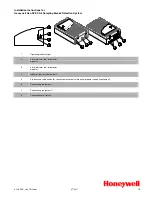
© 2004 directed electronics, inc.
11
There are eight different types of common door lock circuits found in vehicles (some
vehicles use more unusual systems). The eight most common systems are:
z
Type A: Three-wire (+) pulse controlling factory lock relays.
z
Type B: Three-wire (-) pulse controlling factory lock relays.
z
Type C: Direct-wired reversing-polarity switches. The switches are wired directly
to the motors. This type of door lock system has no factory relays.
z
Type D: Aftermarket actuator-driven systems. These include slave systems without
an actuator in the driver’s door but with factory actuators in all the other doors,
since these can be controlled with the installation of an aftermarket actuator.
z
Type E: Electronically-activated vacuum systems. This requires special program-
ming of the system.
z
Type F: One wire system.
z
Type G: Positive (+) multiplex resistor-based circuit.
z
Type H: Negative (-) multiplex resistor-based circuit.
at the switch
z
Three-wire switches will have either a constant ground input or a constant
(+)12V input, along with the pulsed lock and unlock outputs to the factory relays.
z
Some vehicles have no external switch. The switches are inside the actuator, and
instead of pulsing, the proper wires will flip-flop from (+)12V to (-) ground as the
door locks are operated.
z
Direct-wired switches will have a (+)12V constant input and one or two (-)
ground inputs, along with two output leads going directly to the lock motors.














































